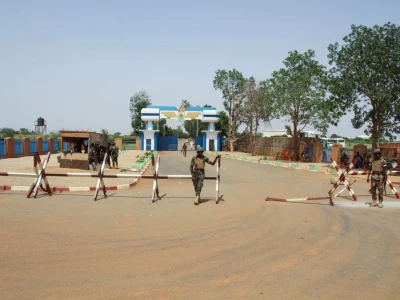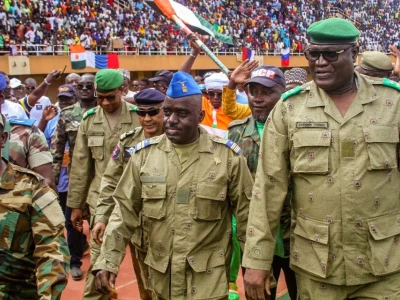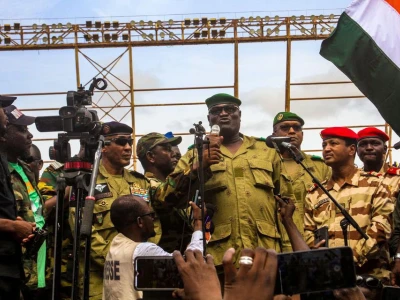
Niger junta meets Nigeria envoys ahead of summit with regional leaders
The junta has revoked military pacts with France, but Paris has rejected that decision, saying it was not taken by Niger's legitimate authorities.
NIAMEY, Aug 9 (Reuters) - Niger's military junta met with two Nigerian envoys on Wednesday, offering hope for dialogue before a summit with regional leaders that could result in military action to restore democracy.
The talks took place as Niger accused France of violating its airspace, attacking a military camp and freeing "terrorists" to undermine the country. Paris denied the charges.
Army officer Amadou Abdramane, speaking for the coup leaders, made the allegations in a video statement without providing evidence, stoking tension ahead of Thursday's meeting of West African heads of state, who are expected to discuss options including military action against the junta.
"What we are seeing is a plan to destabilise our country," Abdramane said.
France's foreign ministry rejected the accusations, saying its aircraft was operating under an existing agreement with Niger forces and its troops were in the west African nation at the request of legitimate authorities.
During its standoff, the junta has rebuffed diplomatic overtures from African, U.S. and U.N. envoys. The junta leaders made an exception by meeting on Wednesday with two envoys of Nigerian President Bola Tinubu, who also chairs the Economic Community of West African States (ECOWAS), in the capital Niamey, a Nigerian government source said.
The envoys - prominent traditional leaders Lamido Muhammad Sanusi and Abdullsalami Abubarkar - were allowed into the country despite closed borders.
Only Sanusi met junta leader General Abdourahamane Tiani, while his counterpart met with other representatives at the airport.
"It went well," Sanusi told reporters upon his return to Abuja without sharing further details.
"CRUEL" DETENTION
The party of Niger's deposed president, Mohamed Bazoum, accused the junta, which seized power on July 26, of keeping him and his family in "cruel" and "inhumane" detention at the presidential residence.
In a statement calling for a nationwide mobilisation to save them, the PNDS-Tarayya party on Wednesday said the Bazoums had no running water, no electricity and no access to fresh goods or doctors.
State Department spokesperson Matthew Miller said the U.S. was greatly worried about Bazoum's safety and was still looking for a reversal of the military takeover.
"We continue to engage with our partners in the region. We continue to engage with other governments," he told a briefing.
U.S. troops are in Niger along with French, Italian and German forces as part of international efforts to combat Islamist insurgents devastating the Sahel region under agreements with the now-deposed civilian government.
Rhetoric against former colonial power France has been a feature of coups in the region over the past two years, including in Mali and Burkina Faso, whose army rulers are strongly backing the generals now in charge in Niamey.
The junta has revoked military pacts with France, but Paris has rejected that decision, saying it was not taken by Niger's legitimate authorities.
INTERNAL CHALLENGE
The coup was triggered by internal politics but spun into an international drama. ECOWAS, the United Nations and Western countries have pressured the junta to stand down, while Mali and Burkina Faso have vowed to defend it.
The political scene became more complex on Wednesday as former rebel Rhissa Ag Boula announced a new Council of Resistance for the Republic (CRR) aimed at reinstating Bazoum.
"Niger is the victim of a tragedy orchestrated by people charged with protecting it," Ag Boula's statement said. The CRR would use "any means necessary" to stop the military takeover and supports international diplomacy, he said.
The challenge from Ag Boula raises the spectre of internal conflict in Niger, which until the coup was an important ally for the West in a region where other countries have turned towards Russia.
Western powers fear Russian influence could grow stronger if the junta in Niger follows Mali's example by ejecting Western troops and inviting in mercenaries from Russia's Wagner Group.
Ag Boula played a leading role in uprisings by Tuaregs, a nomadic ethnic group in Niger's desert north, in the 1990s and 2000s. Like many former rebels, he was integrated into government under Bazoum and his predecessor, Mahamadou Issoufou.
The coup's border and airspace closures have cut off supplies and hampered aid. The takeover has also prompted foreign financial sanctions against one of the world's poorest countries.
Related
Related

Niger junta says a dozen soldiers killed in militant attack

Blinken speaks with Niger former president - US State Dept

Niger hit with more sanctions as junta rebuffs latest diplomatic

